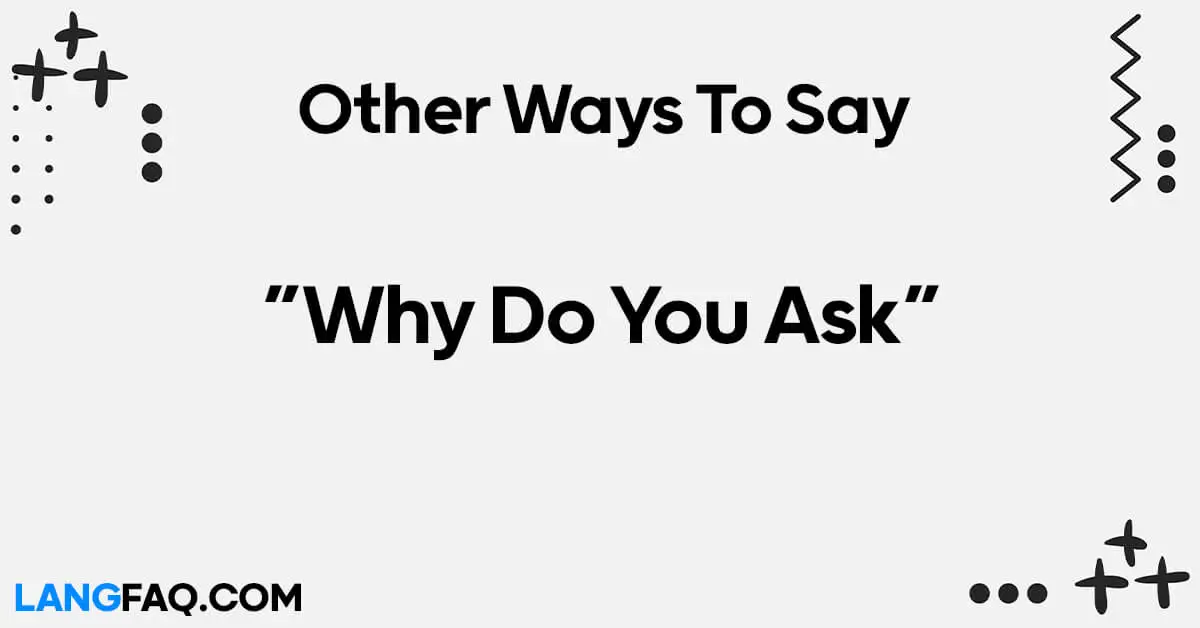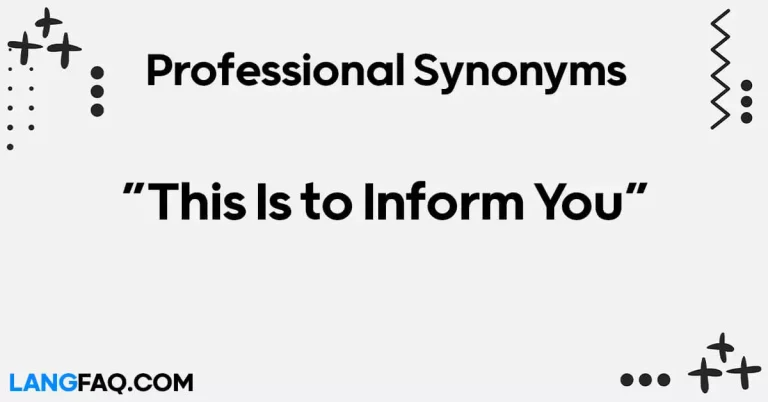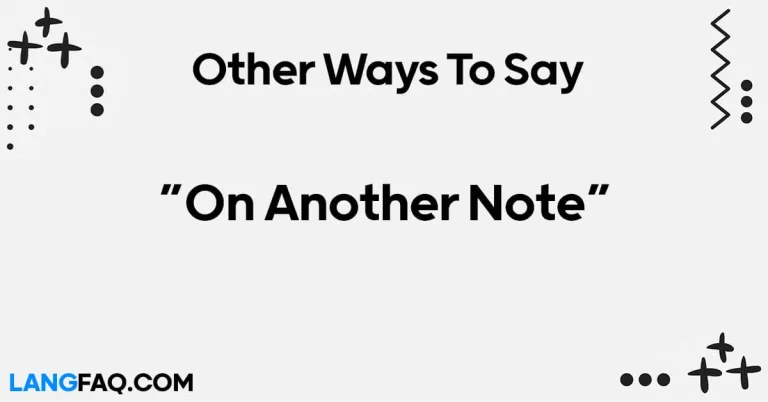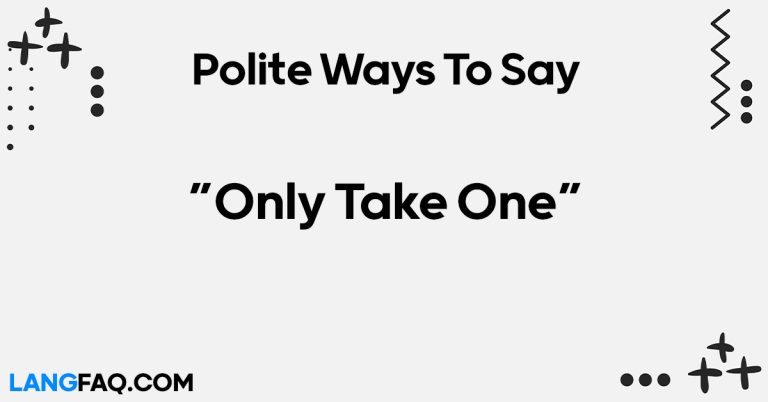Are you tired of using the same old phrases when someone asks you, “Why do you ask?” It’s time to expand your vocabulary and add variety to your conversations. In this article, we will explore 14 creative alternatives to this common question. Whether you want to sound more polite, curious, or simply want to change things up, these alternatives will help you express yourself in a refreshing way.
Communication is an essential part of our daily lives, and the way we phrase our questions can make a big difference in how they are received. Instead of relying on the same old response, “Why do you ask?” you can choose from a diverse set of expressions to suit the context and tone of your conversation. Let’s dive into these alternatives and enrich your conversational skills.
Exploring 14 Alternative Phrases
- What’s the reason behind your curiosity? – This phrase conveys a sense of genuine interest in the other person’s question.
- Could you share your motivation? – A polite way to inquire about someone’s intentions.
- I’m curious about your inquiry. – Express your own curiosity in a friendly manner.
- What’s the story behind your question? – Encourage the other person to share more details.
- Could you elaborate on your query? – Ask for a more detailed explanation.
- I’m interested in knowing more. – Show your eagerness to learn.
- Is there a specific reason for your question? – Request clarification without being confrontational.
- Could you shed some light on your inquiry? – Encourage the person to provide additional information.
- I’d love to hear your perspective. – Create an open and welcoming atmosphere for discussion.
- What’s the thinking behind your question? – Ask about the thought process behind their query.
- Could you give me some context for your inquiry? – Seek additional information to understand better.
- I’m intrigued by your question. – Express your interest in their query.
- Is there a particular purpose behind your question? – Politely inquire about their intentions.
- Could you provide more insight into your inquiry? – Encourage them to share their thoughts and feelings.
1. What’s the reason behind your curiosity?
When to Use:
- Use this phrase when you genuinely want to know more about the other person’s thoughts, ideas, or motivations.
- It’s suitable for both formal and informal conversations, making it versatile in various settings.
Example: Imagine receiving an email from a colleague inquiring about your recent project’s success. Instead of a straightforward response, consider saying, “What’s the reason behind your curiosity?” This not only acknowledges their interest but also encourages a more in-depth discussion.
Grammar Tip: In this phrase, “What’s” is a contraction of “What is.” Utilizing contractions like this adds a natural flow to your conversation, making it sound less formal and more approachable.
2. Could you share your motivation?
When to Use:
- Use this phrase when you want to understand the driving force behind someone’s query.
- It’s suitable for both professional and personal interactions, especially when you want to maintain a respectful tone.
Example: Suppose you receive an email from a colleague asking why you decided to pursue a particular project. Instead of responding with a plain answer, you can say, “Could you share your motivation?” This demonstrates your interest in their curiosity and encourages a more meaningful conversation.
Related Grammar Rule: The word “motivation” is a noun that refers to the reasons or incentives that drive a person to do something. When using nouns in questions, you can often follow this structure: “Could you share your [noun]?”
3. I’m curious about your inquiry.
When to Use:
- Use this phrase when you want to emphasize your own interest in the subject.
- It’s suitable for informal conversations, such as when talking to friends or acquaintances.
Example: Imagine you receive an email from a friend asking about your recent travels. Instead of providing a standard response, you can say, “I’m curious about your inquiry.” This not only acknowledges their question but also invites them to share their curiosity or interest in your adventures.
Tip: Using the word “curious” in this phrase indicates your desire to learn or know more. It’s a great way to keep the conversation engaging and open.
4. What’s the story behind your question?
When to Use:
- Use this phrase when you want to encourage the other person to share more details or provide context for their question.
- It’s suitable for informal conversations where you want to maintain a conversational and friendly tone.
Example: Suppose you receive an email from a family member asking about your recent career change. Instead of responding with a plain answer, you can say, “What’s the story behind your question?” This prompts them to provide more context or share their interest, leading to a richer conversation.
Tip: The word “story” in this phrase implies that you’re interested in hearing more than just a simple answer. You want to know the narrative or background behind their question.
5. Could you elaborate on your query?
When to Use:
- Use this phrase in situations where you need a more comprehensive answer or when the initial question is vague.
- It’s suitable for both formal and informal conversations, especially when seeking clarity.
Example: Imagine receiving an email from a colleague asking about a project, but their question lacks specificity. Instead of providing a brief response, you can say, “Could you elaborate on your query?” This encourages them to provide more specific information, making the conversation more productive.
Grammar Note: “Elaborate” is a verb meaning to provide more details or information about something. Using it in this phrase indicates your desire for a more in-depth response.
By incorporating these alternative phrases into your written communication, you can enhance your ability to engage others effectively, express genuine interest, and maintain a respectful and friendly tone. Each phrase serves a unique purpose, allowing you to navigate various situations with finesse. So, the next time you encounter a question in written form, consider using one of these creative alternatives to enrich your written exchanges.
6. I’m interested in knowing more.
When to Use:
- Use this phrase when you want to express your eagerness to learn and gain further insights.
- It’s versatile and can be applied in both formal and informal written communication.
Example: If you receive an email from a potential client asking about your company’s services, instead of providing a simple list, you can respond with, “I’m interested in knowing more.” This indicates your genuine curiosity and willingness to provide comprehensive information.
Tip: By using this phrase, you convey your openness to engage in a meaningful dialogue and encourage the other party to share additional details.
7. Is there a specific reason for your question?
When to Use:
- Use this phrase when you want to inquire about the underlying motive behind someone’s inquiry, particularly in a professional context.
- It helps maintain a respectful and business-appropriate tone.
Example: In a business email, if a client asks about your pricing structure, you can reply with, “Is there a specific reason for your question?” This demonstrates your professionalism and allows the client to clarify their needs or concerns.
Exception: In casual or personal conversations, you may opt for a more relaxed phrase to maintain a friendly atmosphere.
8. Could you shed some light on your inquiry?
When to Use:
- Use this phrase when you want the other person to provide additional information or insights into their question.
- It’s suitable for both formal and informal written communication.
Example: If you receive an email from a colleague asking about a complex project, you can respond with, “Could you shed some light on your inquiry?” This invites them to provide more context or specify their areas of interest.
Tip: Using phrases like “shed some light” adds a metaphorical and engaging element to your written communication, making it more memorable.
9. I’d love to hear your perspective.
When to Use:
- Use this phrase when you want to create an open and welcoming atmosphere for discussion and encourage the other person to share their viewpoint.
- It’s effective in both formal and informal contexts.
Example: Imagine you receive an email from a colleague asking for your thoughts on a project. Instead of a plain response, you can say, “I’d love to hear your perspective.” This expresses your interest in their input and fosters collaboration.
Grammar Note: In this phrase, “I’d” is a contraction of “I would,” showcasing a friendly and approachable tone.
10. What’s the thinking behind your question?
When to Use:
- Use this phrase when you want to ask about the thought process or rationale behind someone’s inquiry.
- It’s versatile and can be employed in both formal and informal written communication.
Example: If you receive an email from a colleague asking about your approach to problem-solving, you can respond with, “What’s the thinking behind your question?” This encourages them to share their curiosity and promotes a thoughtful discussion.
Tip: The phrase “thinking behind” indicates your interest in the logic or reasoning behind their question, making it a valuable alternative.
11. Could you give me some context for your inquiry?
When to Use:
- Use this phrase when you need additional information or context to fully understand the other person’s question.
- It’s appropriate for formal and professional communication.
Example: Suppose you receive an email from a client inquiring about a specific project milestone. To ensure you provide the most accurate response, you can say, “Could you give me some context for your inquiry?” This allows the client to provide necessary details.
Grammar Tip: “Context” refers to the circumstances or background information related to a situation. Using this term indicates your desire for a clearer understanding.
12. I’m intrigued by your question.
When to Use:
- Use this phrase when you want to express your personal interest and curiosity about the other person’s query.
- It’s suitable for both formal and informal written communication.
Example: Imagine you receive an email from a friend asking about a fascinating book you’ve recently read. Instead of responding with a basic answer, you can say, “I’m intrigued by your question.” This conveys your excitement and invites them to share their interest in the topic.
Tip: By using the word “intrigued,” you express your fascination, making the conversation more engaging and inviting further discussion.
These alternative phrases provide valuable tools for enriching your written communication and fostering meaningful dialogues. They allow you to tailor your responses to various situations, express genuine interest, and create a positive and engaging tone in your emails, messages, or written correspondence. By mastering these alternatives, you can enhance your communication skills and connect more effectively with others in both personal and professional contexts.
How can I use these alternatives effectively in a conversation?
Effectively using these alternatives in a conversation requires considering the context, tone, and your relationship with the other person. Here are some tips for using them effectively:
- Context Matters: Choose the alternative phrase that best fits the situation. Some phrases may be more suitable for formal settings, while others work well in casual conversations.
- Match the Tone: Ensure that your chosen phrase aligns with the tone of the conversation. Use formal alternatives in professional contexts and casual ones among friends.
- Listen Actively: Pay attention to the other person’s response and adapt your communication accordingly. If they seem receptive to your alternative phrase, continue using it.
- Be Genuine: Express sincere interest when using these alternatives. Authenticity can go a long way in building rapport.
Are these alternatives suitable for both formal and informal conversations?
Yes, these alternatives are versatile and can be applied to both formal and informal conversations. However, it’s essential to gauge the atmosphere and the nature of the relationship between you and the other person. In formal settings, opt for more professional alternatives, while in informal conversations, you can choose the ones that maintain a friendly and approachable tone.
Can I mix and match these alternatives?
Absolutely! Mixing and matching these alternatives can keep your conversations interesting and engaging. Feel free to adapt your choice of phrase to the specific context and your conversational partner. It shows your versatility in communication and can make your interactions more dynamic.
Are there situations where it’s better to stick with “Why do you ask?”
While these alternatives can add variety and depth to your conversations, there may be instances where simplicity is preferred. For straightforward or casual questions, “Why do you ask?” remains a perfectly acceptable and clear response. Use your judgment to determine when to employ these alternatives and when to keep it simple.
What if the other person doesn’t understand the alternative phrase I use?
If the other person doesn’t understand the alternative phrase you’ve used, it’s essential to ensure clear communication. You can:
- Offer an Explanation: Provide a brief explanation of the phrase’s meaning to clarify.
- Rephrase: If necessary, rephrase your response using a more straightforward and familiar expression.
- Encourage Questions: Encourage the other person to ask for clarification or more details if they’re unsure.
Effective communication is about mutual understanding, so don’t hesitate to adapt if needed to ensure a smooth conversation.
Where can I learn more about effective communication?
Improving your communication skills is a valuable endeavor. To take your communication to the next level, consider exploring resources such as:
- Books: There are numerous books on effective communication, including classics like “How to Win Friends and Influence People” by Dale Carnegie and “Crucial Conversations” by Al Switzler, Joseph Grenny, and Ron McMillan.
- Online Courses: Platforms like Coursera, edX, and LinkedIn Learning offer courses on communication skills.
- Practice: The more you engage in conversations and apply what you’ve learned, the better your communication skills will become. Practice active listening, empathy, and adapting to different situations.
By continually honing your communication skills, you’ll become a more confident and versatile communicator, capable of navigating a wide range of conversations effectively.
Frequently Asked Questions
How can I use these alternatives effectively in a conversation?
To use these alternatives effectively, consider the context and tone of the conversation. Choose a phrase that suits the situation and your relationship with the other person.
Are these alternatives suitable for both formal and informal conversations?
Yes, these alternatives can be used in both formal and informal conversations. However, it’s essential to gauge the atmosphere and select an appropriate phrase accordingly.
Can I mix and match these alternatives?
Absolutely! Feel free to mix and match these alternatives to keep your conversations interesting and engaging.
Are there situations where it’s better to stick with “Why do you ask?”
While these alternatives can add variety to your conversations, there may be instances where simplicity is preferred. Use your judgment to determine when to use these alternatives.
What if the other person doesn’t understand the alternative phrase I use?
If the other person doesn’t understand, you can politely explain the meaning behind the alternative phrase or rephrase your question using a more familiar term.
Where can I learn more about effective communication?
To improve your communication skills further, consider reading books or taking courses on effective communication. There are plenty of resources available to help you become a better communicator.
Conclusion
Expanding your vocabulary and exploring alternative ways to ask questions can enhance your communication skills and make your conversations more engaging. The next time someone asks you, “Why do you ask?” consider using one of these creative alternatives to add depth and variety to your interactions.
Don’t forget to keep practicing and experimenting with these phrases to become a more confident and versatile communicator.







